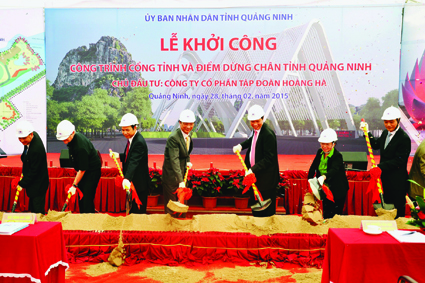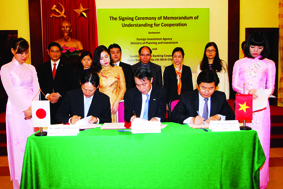 |
| Assembling automobiles at SAMCO, Ho Chi Minh City__Photo: An Hieu/VNA |
Bui Duc Giang[1] and Le Trong Dung[2]
KEY POINTS:
l The new law on enterprises introduces a new definition of state-owned enterprise;
l In principle, projects carried out by an enterprise the capital of which is not wholly held by the State will fall outside the scope of application of the law on tendering;
l However, tendering management authority adopts another approach on this question.
On November 26, 2014, Law on Enterprises No. 68/2014/QH13 was passed by the National Assembly (the “2014 Law on Enterprises”). It will take effect starting July 1, 2015. This 2014 Law on Enterprises introduces significant changes compared to the current law[3]. One of those new changes consists of the introduction of a new concept of state-owned enterprise. Indeed pursuant to Article 4.8 of the new law, “a state-owned enterprise means an enterprise in which the State holds 100% of the charter capital”. This means that only enterprises of which the charter capital is wholly held by the State will be considered as state-owned enterprises[4]. In comparison, under Article 4.22 of Law No. 60/2005/QH11 on Enterprises dated 29 November 2005, as amended in 2009 and 2013, “a state-owned enterprise means an enterprise in which the State owns more than 50% of the charter capital”. With regard to tendering, under Law No. 43/2013/QH13 on Tendering dated 26 November 2013, (the “Law on Tendering”), competitive tendering is required for the selection of contractors providing consulting service[5], non-consulting service[6], goods and civil works in case of projects with a certain percentage of state funding. What impacts will the new definition of a state-owned enterprise have over the implementation of projects by enterprises in which the State is holding less than 100% of the charter capital? This article will try to provide an answer to this question on the basis of the relevant legal texts and practice...
[1] PhD in law Associate at Audier and Partners Vietnam LLC;
[2] Senior Legal Counsel, Legal Department, JSC Bank for Foreign Trade of Vietnam (Vietcombank).
This article reflects the authors’ own opinion.
[3] For a full discussion of the new changes, see Tran Thanh Tung, “The 2014 Law on Enterprises extends the right of business freedom” (Luật doanh nghiệp 2014 mở rộng quyền tự do kinh doanh), the Saigon Times Online, December 7, 2014, and Phan Duc Hieu, “Top three changes of the new Enterprise Law”, Vietnam Law & Legal Forum, Vol. 21 - issue 244 December 2014.
[4] For further comments on this approach, see Roundtable “New definition of state-owned enterprises” (Định nghĩa mới về doanh nghiệp Nhà nước), co-ordinated by My Le, the Saigon Times Online, December 11, 2014.
[5] “Consulting service” means one or a number of activities including: preparation, assessment of the planning report, overall development
diagram, architecture; survey and formulation of pre-feasibility study report, feasibility study report, environmental impact assessment report; survey and formulation of engineering, estimate; preparation of dossiers of invitation for expression of interest, dossier of invitation for pre-qualification, dossiers of invitation for tendering, dossiers of requirements; assessment of dossiers of expression of interest, dossiers of prequalification participation, tendering dossiers, dossiers of proposals; verification, appraisal; supervision; management of project; arranging finance; audit, trainings, transfer of technologies and other advisory services (Article 4.8 of the Law on Tendering).
[6] “Non-consulting service” means one or a number of activities including: logistics, insurance, advertisement, installation (apart from construction and installation of construction works), pre-acceptance test and operation run, trainings, maintenance, drawing maps and other activities that do not fall within the scope of “consulting service” (Article 4.9 of the Law on Tendering).







